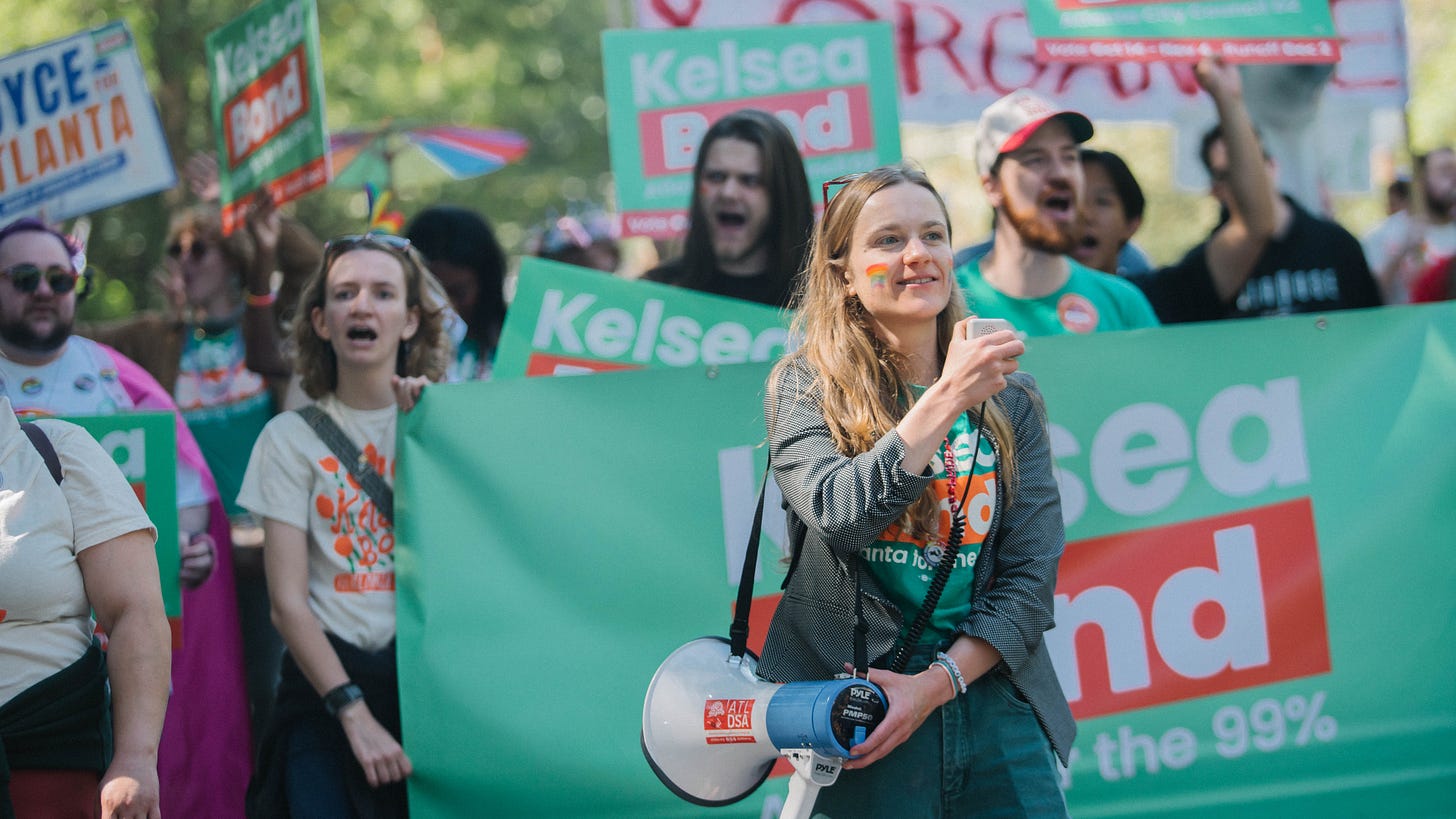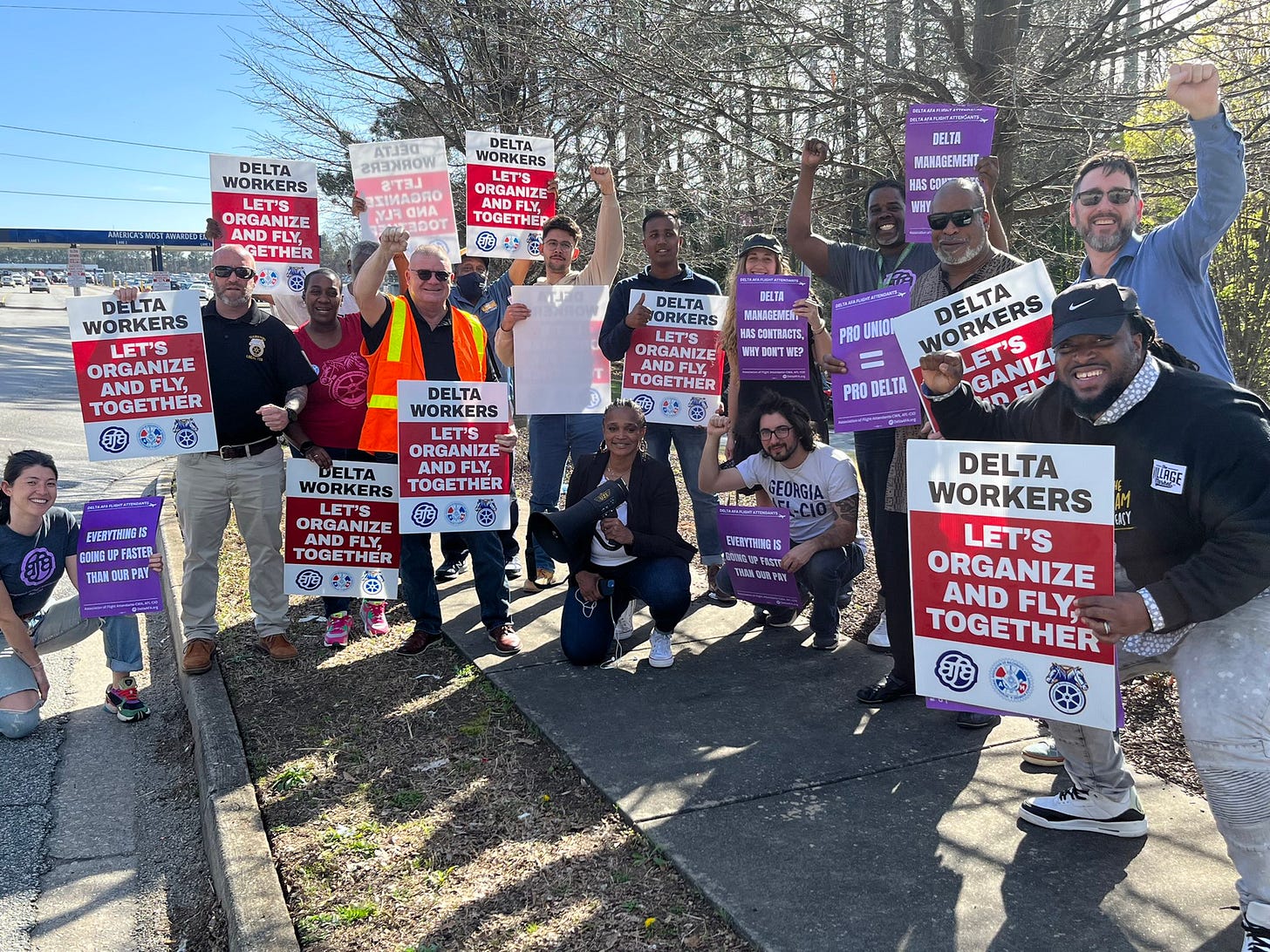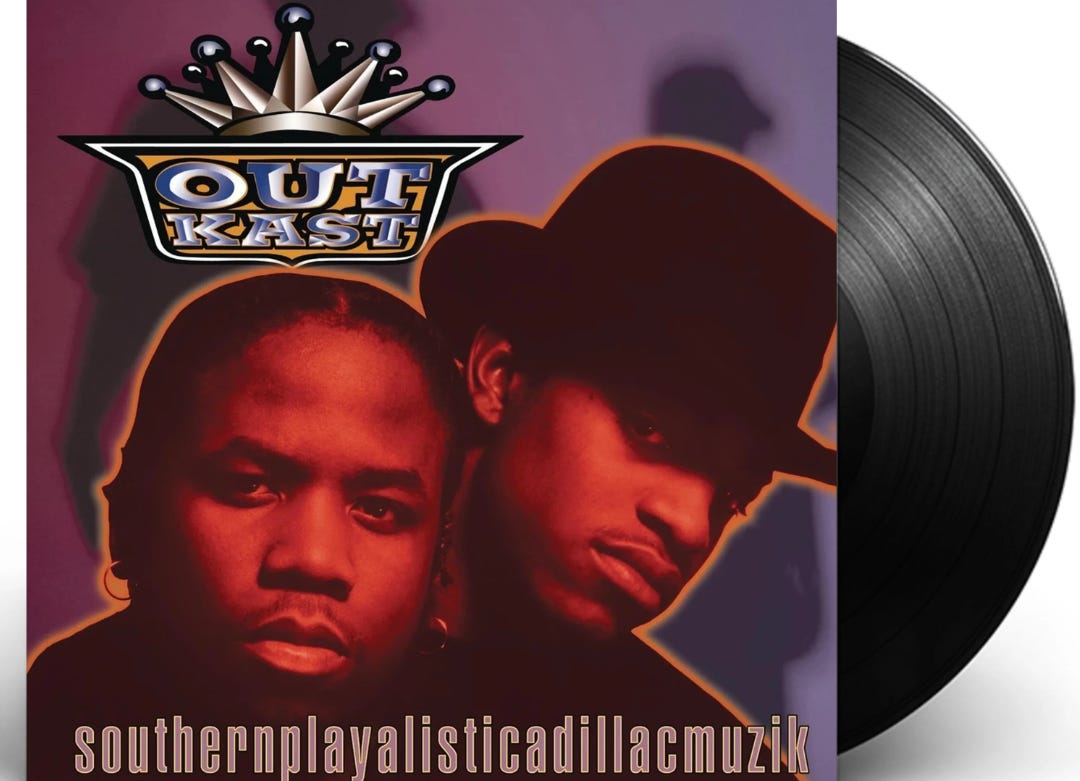The DSA Candidate Who Won Down South
An interview with newly elected Atlanta City Council member Kelsea Bond
Zohran Mamdani was not the only Democratic Socialist who just won a citywide election. In Atlanta, 31 year-old DSA member Kelsea Bond (who uses they/ them pronouns) handily won a race for City Council. That makes them the only socialist to win an election this year in the South, and just the second DSA candidate to win elected office in Georgia, after Gabriel Sanchez was elected to the statehouse there—in a campaign that Bond managed.
We spoke to Bond about their priorities, building socialist power down South, and the prospects for a glorious DSA political wave in the USA.
How Things Work: You were involved in the labor movement. How did that draw you into politics?
Kelsea Bond: I got involved in DSA in 2020. So much was happening with the Covid pandemic, Bernie not making it past the primary, and then of course the Black Lives Matter protests all over the country. In 2021 Nabisco workers went on strike, and they had a picket line out in a Georgia suburb. That was really my first time being on a picket line, growing up in the South and not being super familiar with unions. I remember at the time being disappointed with how many losses there had been on the left. Especially here in Atlanta, with the original Cop City ordinance getting passed in 2021. And then just a month later, seeing a bunch of regular, ordinary people win a good contract just because they went on strike and withheld their labor. That was really powerful for me, and solidified my understanding of how crucial labor organizing is if we want to win anything that we want in this country.
From then, I went on to help organizing Starbucks workers when they filed their first union election in Midtown Atlanta, and I went on to help them organize more stores in the area. Then was organizing strike solidarity for the Teamsters during their practice pickets in 2022, and UAW, and went on to work with almost every major labor union in the city. I was really happy to have had those same unions support me in this election. That felt very powerful to me.
What can you do from the City Council to help out the labor movement in Atlanta?
Bond: There’s a few ways to tackle that. We’re a blue city in a red state, so we face a lot of state preemptions here. In Georgia, public sector workers don’t have bargaining rights, which would have to change at the state level. We’re a “right to work” state, at-will employment, all the kinds of common [labor] preemptions that exist in southern states. So primarily I want to use my platform as a City Council member to support union organizing and just be vocal about that. We had Starbucks stores organizing in Midtown, and those Council members never came out to a single picket line or sip-in, or gave meaningful support in any way.
Atlanta’s airport is the busiest in the world, and it has been the home of very many union drives in the last several years, specifically with Delta workers. That’s the biggest organizing drive going on in the nation right now—Delta workers organizing with the Association of Flight Attendants. Teamsters were organizing bus drivers, and the Machinists Union was organizing ramp workers. This has gotten basically no attention by our mayor or City Council, and this probably has something to do with Delta’s campaign contributions and the role they play in Atlanta’s politics in general.
Tell me about the rest of your platform. What will your priorities be on City Council?
Bond: So—and this is all recognizing that I will be the most progressive person on City Council, I will be a minority voice. There are allies who overlap in terms of expanding public transit and other issues like that. From my perspective, one of the biggest crises facing Atlanta right now is our affordable housing crisis. Atlanta is a rapidly growing city. For better or worse, a lot of the people moving here make higher incomes on average than the folks who live here, which is just creating the cycle of displacement. A lot of the new housing that’s being built is for those higher income folks. We’re really not investing the way we should in deeply affordable housing. We have developers systematically opting out of building deeply affordable units because there’s this loophole that they can just pay a small fine, and it goes into this trust fund, and the trust fund itself has not really been spent the way that it’s supposed to.
So housing is a big priority. There’s also public transit. Atlanta has some of the worst traffic, notoriously, in the country, and we’re pretty behind on public transit. We voted on this referendum in 2016 to expand transit, with a 17-project list. That included bus rapid transit, but also light rail. The original proposal for the Beltline [a popular citywide trail system] was for light rail to border it, because it was meant to be a transit corridor. But over the past decade it’s just really acted as a gentrification engine. There were many promises to prioritize housing affordability and all these other good things on the Beltline, but it’s really just become super expensive and caters to this upper middle class clientele, with yogurt shops and brunch shops and yoga and doggy daycare. Because it’s an election year, business interests and developer interests used that opportunity to pressure the mayor to pivot on the Beltline rail, and he kind of changed up the plans in a way that would mean we wouldn’t start construction for another decade… I think there’s going to be a big push from transit and climate activists to make sure we proceed with that plan during the City Council term. That will probably be my number one priority, because transit affects so many other things.
In New York City, during Zohran Mamdani’s mayoral campaign there was a lot of scaremongering and red-baiting around his connection to DSA. Was that something you encountered in your own race?
Bond: Weirdly, no. This district is the first or second-youngest district in Atlanta. It’s probably the second-most progressive. Very progressive young area. I keep reminding journalists that Bernie Sanders won multiple precincts in this district in 2016. So I think we’re really lucky that democratic socialism, since Bernie’s first run, has become very normalized in many ways. People have come to understand it through the framework of our big issue demands nationwide—Medicare for all, Green New Deal. Obviously AOC and Zohran Mamdani are now household names. I think the main issue people in progressive neighborhoods like this might have with democratic socialists is just doubting our viability. And that’s part of why we tried to demonstrate so early on that we were viable, by raising a lot of money, bringing in a lot of endorsements. I think that Zohran’s primary win showed a lot of people that “Oh, they can really do this. They can win big municipal seats.”
Also, our main opponent in this race was the wife of a multimillionaire commercial real estate CEO, who has more hidden, right wing Republican affiliations, and we were unclear whether she would try to attack us for being socialist. She actually did a poll on democratic socialism in our district, and we responded by doing our own poll, which showed that democratic socialism is popular and did not harm our chances at all. Weirdly, the light rail project was more contentious than democratic socialism. I think we’ve gotten to the point, at least in big cities, where people are not afraid of it at all.
Given how progressive your district is, how much do you think your own success can be translated into other cities? Does your win have lessons to teach other socialist candidates, or were you just in a unique place?
Bond: It’s all about, one, choosing the right district—making sure that you are running in an area that is somewhat diverse, younger, renters. Our messaging may not have resonated in other City Council districts in Atlanta, so we were very intentional about where we were running. I also think it matters a lot to be in tune with the local political climate and what issues are going to resonate with voters. That’s part of why we really championed the Beltline rail project outright. Even if not everybody in my district is a socialist, they really cared about Beltline rail and public transit. I think if I had just run saying “I’m a socialist, I’m a socialist,” people would have said, “and so what? What are you going to do?” So knowing how to translate your ideology into policy demands that make sense to people is really important.
I will say that there has been this big resurgence in both labor organizing and progressive organizing in Atlanta since Cop City. Which I think was not the full reason we won, but it definitely created this environment where there was frustration towards the city government, and also this kind of shared consciousness about the lack of democracy in Atlanta’s government. So my recommendation for other similarly-sized cities trying to run a socialist would be to build on some kind of issue demand. Try to tackle issue campaigns that really resonate with people before diving into a full electoral program. That can kind of create the base of voters that you need, and volunteers.
A lot of progressives who run for office—especially those with politics similar to yours—struggle with the question of whether to focus on pulling the Democratic Party left, or whether to try to build their own lane, as DSA or something else. How did you think about that question?
Bond: We’re kind of lucky in Atlanta. Our municipal races are nonpartisan. People definitely asked at the doors, “Are you a Republican or a Democrat?” But that was still a minority. I was Gabriel Sanchez’s campaign manager last year for his campaign up in Smyrna for state House. He ran on the Democratic ballot line, and I think we got a lot more questions about that in this clearly partisan race for him. I’m in a lucky position where I don’t have to think very much about my relationship to the Democratic Party. People are not really caucused that way in Atlanta city government. Which I think has good and bad implications. In some cases, it results in people who vote Democrat in that body actually taking very right wing positions at times. And also, some Republicans obfuscating their Republican affiliations in a way that’s intentional. But for me, it means that I can have my full political beliefs without pledging allegiance to some party one way or another. In some ways, it creates more freedom. I have been saying, I’m an independent and a socialist in this race.
Another issue that came up in New York City was Zohran’s opponents trying to hang every single item in the DSA platform on his neck and make him answer for all of them. What’s your relationship with DSA, and how should voters interpret that?
Bond: I think most DSA members are pretty critical of the DSA platform, because it’s just this long laundry list of every issue you could fathom, and I don’t think that translates well to voters. I think it’s better to put forward a political narrative with some kind of broad goals, as opposed to having a predetermined stance on every single issue under the sun. So I am glad—I believe during the last DSA convention, we narrowed that down to a more broad program, the “Workers Deserve More” program. But weirdly, I have not really had voters nitpicking DSA. It’s really interesting how that played out so differently in New York City, I think just because it was a more high profile race.
But here in Atlanta, DSA exists in the progressive left ecosystem, along with lots of other groups. We put out a voter guide every year that way more people use than you would think. I wouldn’t say we’re a household name yet. That’s the goal. But voters are familiar with us, and I think when you have local chapters that are present at protests and present on social media, it kind of takes that Boogeyman effect away—like, “Oh, these are people I know.” Probably a lot of voters in my district know a DSA member, have a family member who’s in DSA, and that kind of demystifies the organization.
You’re technically part of a little DSA wave in this election—you, Zohran, Katie Wilson winning Seattle mayor, and some others around the country. A lot of people on the left probably feel like this is the only good thing happening in American politics right now. What’s your big picture outlook on national politics for the next few years?
Bond: We intentionally launched this race the week of Trump’s inauguration. Just because, I knew how I felt the first time he won, and I knew that lots of other people—especially young people who weren’t paying attention back then—were going to be feeling some type of way. We wanted to use that energy to funnel it towards something positive, to give people some hope during these scary times. I think that was really effective. We saw a ton of energy for canvassing and all of our other events throughout the campaign. And at the door, especially earlier in the year, so many voters, their top issue was Trump. Of course we tried to relate that to local politics and our local platform. But the message there that worked was: Yeah, that’s why we’re running progressives who are fighters for local office. So we can stand up to the corporate bullies.
We also saw that we had very high young voter turnout in our district. It was 25% under 30 in District 2, compared to 14% citywide. But we also won every demographic, including older voters. There were actually quite a lot of older voters in my district going out to the 50501 mass protests and Indivisible type events. That energy also translated into our victory, because people across all age ranges are realizing how screwed up things are right now. I had true blue, strong Democrat voters at the door complaining to me about Chuck Schumer caving. So I think there really is this widespread frustration with the Democratic Party not standing up to Trump. If we have ever had a political opening for socialists, I think that moment is now. And we are using it to our best ability, electing Zohran and electing me here. So many people come up to me. I’m in a very small, walkable district, so I get recognized walking down the street. People will be like, “You’ve brought me hope! I haven’t felt hope in so long.”
I think these wins will create the momentum for more political wins in the future, as long as we stick with the strategy. Next presidential election, my hope is that the progressive and labor left will draft somebody who we can all get behind and be excited about. Whether they win or not, I think it’s really important to put somebody up.
LIGHTNING ROUND: 5 QUESTIONS ABOUT ATLANTA WITH KELSEA BOND
Best musician from Atlanta?
Bond: It’s Outkast! [TRUE]
Favorite restaurant in Atlanta?
Bond: I’ll shout out Eats, that was a longtime Southern style restaurant on Ponce that just closed.
Best activist in Atlanta history?
Bond: Julian Bond, who was the actual first socialist in the Georgia state legislature.
Coolest neighborhood in Atlanta?
Bond: Little Five Points.
What is the second-coolest Southern city after Atlanta?
Bond: New Orleans.
Is New Orleans cooler than Atlanta?
Bond: Kind of, yeah. [TRUE]
Also
Previously, in How Things Work interviews: Zohran Mamdani; Brad Lander; Shawn Fain; Sara Nelson; A tenant union organizer; A striking nurse.
If you’re interested in the labor movement, building political power, and the Delta organizing drive in Atlanta, I bet you would enjoy my book “The Hammer,” which covers those things and more. Available for order from your local independent book store. Also, we must highlight the fact that the striking newspaper workers at the Pittsburgh Post-Gazette who have been on the longest strike in America recently won a pivotal court case that should, if their employers have any decency, mark the end of their battle. How long has their strike been? I interviewed a journalist from the paper who had been on strike for 500 days a year and a half ago. Support them here.
Thank you for reading How Things Work. This publication is true independent media, supported not by advertisers, nor by corporate donors, but by you, my good-looking readers. We have no paywall here, so that anyone can read, regardless of income. I’m able to do this thanks the financial support of everyone who chooses to become paid subscribers. If you’d like to help this place keep going and remain free for all, take a quick second to click the button below and become a paid subscriber yourself. Guaranteed good karma.





Hamilton, thanks for another of your fine posts which I continue to share with others.
For the record, my friend Danny Nowell who identifies as a Democratic Socialist won re election to the Carrboro NC town council this November so there was another socialist voted in down here in the South
Appreciate you covering...not many care about the non costal elite stuff ..